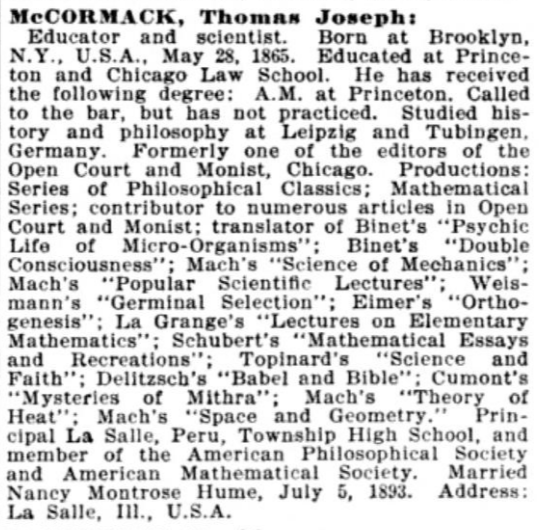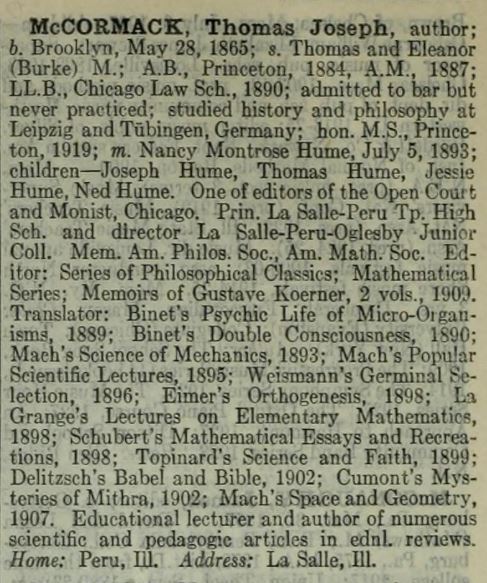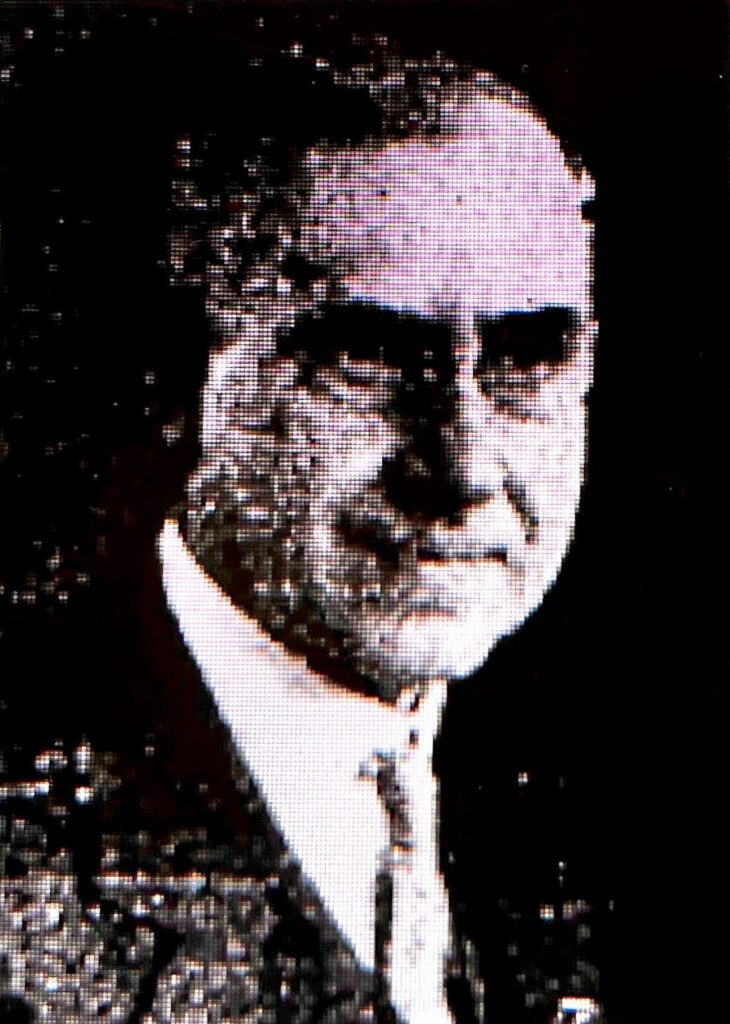Thomas Joseph McCormack (Brooklyn, New York, 28 May 1865 – Peru, Illinois, 24 June 1932) wrote an early review of Victoria Welby’s work. McCormack worked as a translator (German and French) for the Open Court Publishing Company (OCP) and as an assistant editor for its journal The Open Court (published between 1887 and 1936).
Welby had two essaylets published in The Open Court, in 1890 and 1891. After the publication of ‘Meaning and Metaphor’ (1893), in OCP’s The Monist (published 1890–1936 and 1962–present), her correspondence with editor Paul Carus continued. Lady Welby’s library held some of McCormack’s translations.
Through Chicago attorney, amateur philosopher and logician, and editorial contractor Francis C. Russell[?], Charles S. Peirce learned of OCP. Russell persuaded Carus to invite Peirce to write for the inaugural issue of The Monist. Between 1890 and 1913, OCP “published more of Peirce’s philosophical writings than any other publisher during his lifetime, and played a critical role in what little recognition and financial income he received during these difficult, yet philosophically rich, years” – thus the publisher of Stetson Robinson’s The Correspondence of Charles S. Peirce and the Open Court Publishing Company, 1890–1913 (2022).
In 1892 and 1893 McCormack worked with Peirce on a translation of Ernst Mach’s second edition of Die Mechanik in ihrer Entwickelung. Through the years he edited several of Peirce’s articles for The Open Court, and in 1896 he prepared the type for Peirce’s complex article ‘The Logic of Relatives‘ for The Monist.
The Peirce/Welby Correspondence (Hardwick 1977) opens with a letter by OCP to Peirce, dated 1 November 1898, informing him of a pamphlet by Lady Welby, “a woman of high standing in the English aristocracy, having a place among the scientists of Old England”, adding her address in Grantham. Their correspondence started in 1903.
Grains of Sense. By V. Welby. London : J. M. Dent & Co. 1897. Pp. 146.
The distinguished authoress of this pretty little volume has devoted much thought to that department of philosophy which deals with the significance of words, and been instrumental in many ways in the furthering of research designed to lead to the clarification of language. The students of correct expression will welcome therefore the appearance of the booklet, which we may say contains in a popular but exact form the philosophical confession of faith of Lady Welby. The great spiritual and practical need of the times, according to the authoress, is to develop immensely the power of significant communication between mind and mind, as distinguished from the physical mechanisms of communication. ‘We encourage geographical explorers; let us extend the conception and encourage explorers of the expression-world, sending out well-equipped expeditions into the polar regions of meaning. Let us have laboratories of experimental language. We have already shorthand; let us have short-tongue and short-mind—a larger proportion of meaning to expression, more economy in words, more fulness of thought. To this end, the further application of the principle of the alphabet is suggested, the aid of indicative symbols, typographic or pen gesture on the analogy of mouth-gesture, symbolic art-words composed of art-letters, etc., etc. The enormous time which we spend on learning the spelling of the English language is contrasted with the little time or no time which we spend on acquiring the meanings of the language and in giving precision to these meanings. The way to a rational spelling-reform is pointed out and the potency of the English language as a world-speech after appropriate modification is emphasised. Apropos of the wranglings of purists and cranks over reforms in orthography we have the following sense-laden words: “So rigid about the letter and so lax about the spirit: so careful of the petty points of fashion, so careless of the greater points of import: so jealous for the sanctities of convention, so tolerant of the desecration of the inner shrines of speech : so fastidious on what signifies less, and so indifferent on what most of all signifies,—Significance.”
We agree perfectly with the general opinions advanced by the authoress. Surely the present development of civilised language is “arbitrary in the bad sense, and capricious, casual, incoherent, chaotic,” but considering the invention of printing, the advantages of popular education, and the tremendous increase in the speaking and writing population of modern times, it is hardly more so than it was in the past. The authoress is too hard on “bulls.” All living language is built on the corpses of dead bulls. The bulls of the past are the classic expressions of the present. It is not likely that the rustic clowns of ages gone by, from whose speech the creators of literary language must have drawn their material, were less prolific in the delivery of bulls than the unthinking and superficially educated public of to-day. That colossal bull of the French language, the double negative, which doubtless originated in a loose grammatical solecism similar to a very common slip among vulgar English-speaking people to-day, illogical as it may appear on the face of it, is still absolutely harmless in its present usage, never gives rise to obscurity, and is even cited by logicians as a piece of natural testimony that a double negative is not necessarily an affirmative. Bulls should not be permitted to make language, but the fact is, if we can judge from present data, that language was as much bovine in its origin as it is in its more conscious making to-day.
Most of that which Lady Welby has to say upon this subject, and some of the examples which she gives, are pertinent and should be heeded. But some of them are strained and we cannot regard the criticism of the title of “The Descent of Man” as anything else than a piece of quibbling. The word “descent” is not a metaphor but the description of an actual fact, and should not be contrasted with “ascent,” which has a moral and teleological connotation quite foreign to the objective spirit and purpose of Darwin’s inquiry. Much that Lady Welby suggests would lead to the gradual banishing of analogy and metaphor altogether from language, a consummation which, seeing that mathematical abstraction and that concise description without analogy which science demands as its ideal is beyond the reach of the ordinary mind, can be considered as scarcely less than chimerical. “Invisible light” may be paradoxical, but to the child studying physics, far from being confusing, it is luminously suggestive and instructive. It is far easier to extend and correct or contradict an old view than to manufacture a new one, valuable as the last process may be for perfected science. It is contradictory to speak of a flattened sphere, yet it is the method of knowledge and conveys far more to the mind of a child than the correct mathematical expression. The method of scientific discovery is the method of continuity, consisting in the adaptation of old concepts to new needs, and it is not until perfect familiarity with a given province of thought has been gained that we can invest it with that high abstract and mathematical form which is the ideal of the Universal Real Character that philosophers so ardently long for.
The book of Lady Welby is full of sententious and aphoristic utterances which fully justify its title Grains of Sense. We can recommend it unqualifiedly as containing matter which every thinking person should heed, and in view of the present state of linguistic anarchy in our own country, where all expression is running riot and the popular language achieves developments in a decade that formerly would have required centuries, Lady Welby’s advice and admonitions are very timely and will afford parmaceti to many an inward linguistic bruise. T. J. McC.


